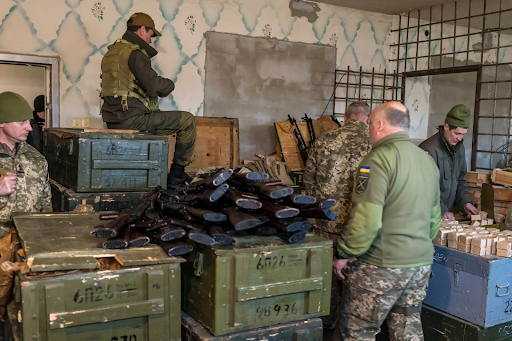EU Opts to Cut Individual Russian Banks from SWIFT, Sanction Central Bank
A dead soldier and a destroyed armored vehicle, both Russian, are slowly covered by snow outside Kharkiv, Ukraine. Tyler Hicks/NYT
A coalition of Western allies - including the United States, the European Union, and the United Kingdom - unleashed a flurry of sanctions against the Russian economy and its elites, in response to Russian President Vladimir Putin’s forcible invasion of Ukraine on Feb. 24.
Seeking to gradually ramp up sanctions in response to further Russian aggression, Western leaders opted for an incremental approach in punishing the Russian economy. These initial packages involved targeted sanctions on some of Russia’s largest banks, freezing the assets of many political elites and oligarchs, including those of Vladimir Putin and Russian Foreign Minister Sergei Lavrov, and halting the certification of the controversial Nord Stream 2 pipeline. They also imposed export controls on an array of critical technological components into Russia, such as semiconductors, avionics, and various software tools.
Two days prior to the Russian forces’ entry into Ukraine, the Russian president recognized the separatist republics of Donetsk and Luhansk in the Donbass region. Putin claimed the invasion – as part of a “special military operation” – was in response to alleged calls for “help” from the Eastern Ukrainian territories.
“[W]e will strive for the demilitarization and denazification of Ukraine,” said Putin, at the outset of the military operation. “Russia cannot feel safe, develop, and exist with a constant threat emanating from the territory of modern Ukraine.”
However, in light of recent escalation in the conflict, Europe’s political will to take bolder action has intensified.
Prior to the invasion of Ukraine, a variety of nations, most notably Germany, expressed reservations at sanctioning Russia’s central bank or excluding it from SWIFT, noting the economic or political circumstances of taking such a step.
“SWIFT is the financial nuclear weapon,” French Finance Minister Bruno Le Maire noted after attending a Friday meeting of EU officials.
SWIFT, known officially as the Society for Worldwide Interbank Financial Telecommunication, is a Belgium-based, cooperative financial messaging service. Serving as the premier intermediary for financial transactions around the world, SWIFT serves as a ‘middle-man’ for more than 11,000 financial institutions across more than 200 countries and territories, making it a central pillar of the global financial system. SWIFT does not handle or transfer any money during a transaction, solely the information and reporting.
Ukrainian military volunteers arm themselves at a storage depot. On Sunday, the EU announced that it would help finance weaponry for the country. Brendan Hoffman/NYT
This all changed on Saturday when, with uncharacteristic unity, the EU put its weight behind expelling select Russian banks from SWIFT and unleashing new sanctions on the country’s central bank. These steps will likely wreak havoc on the Russian economy.
This landmark decision was followed by yet another: the following day, the EU announced that it would finance the acquisition and shipment of military hardware to Ukraine, a first for the bloc. The EU also announced that it would close its airspace to all Russian aircraft, domestic or otherwise.
But what does this mean for Russia?
Western allies have yet to indicate which Russian banks they will target with SWIFT sanctions, although they’re likely to be some of the nation’s largest, such as VTB, Sberbank, or Gazprombank.
A SWIFT ban, even a targeted one, will severely limit Russia’s ability to process international transactions and access financial markets. This does not mean that it will be impossible for Russian institutions and individuals to process transactions (they could relay information through phone or email, or another financial messaging service), but the efficiency and security of Russian commerce will be critically affected.
Sanctions on the Central Bank of the Russian Federation will also help prevent Putin from mitigating the damage of international sanctions. Many commentators have argued that the effects of sanctions on the Russian financial sector may be limited, due to the country’s nearly $650 billion war chest of foreign reserves, composed of a variety of foreign assets - including dollars, euros, yen, gold, and bonds. The decision of Western allies to sanction the Russian Central Bank will limit Putin’s capacity to weather the impending economic storm that will soon hit his country.
Mere days ago, united European support for these sanctions seemed incredibly unlikely, if not impossible. Now, the EU and its peers in Western Europe seem more united - with one another and with their overseas allies - than ever before.
It is unclear whether the EU will continue to ratchet up its sanctions on Russia or its support for Ukraine, but recent events suggest that, regardless, it will do so as a united bloc.


